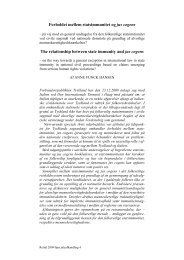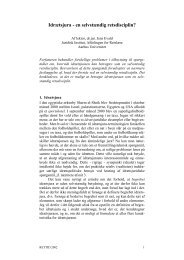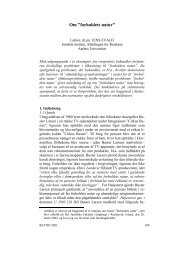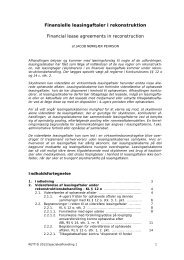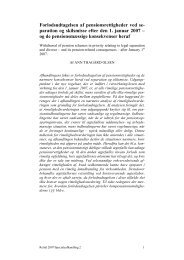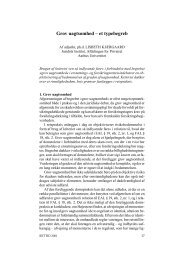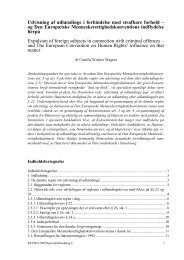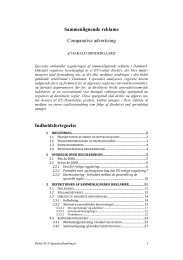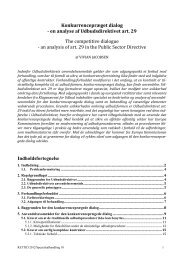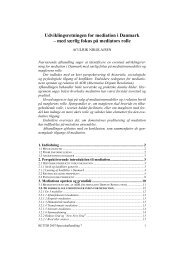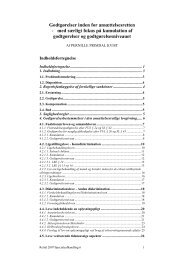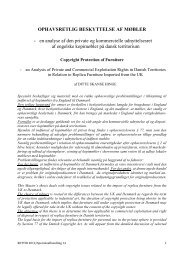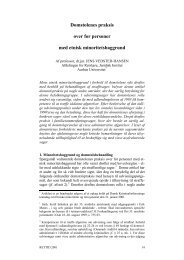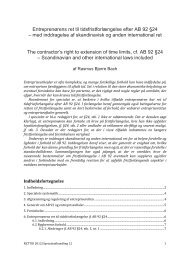Product liability under the CISG and Concurring tort law claims ...
Product liability under the CISG and Concurring tort law claims ...
Product liability under the CISG and Concurring tort law claims ...
Create successful ePaper yourself
Turn your PDF publications into a flip-book with our unique Google optimized e-Paper software.
anty has been given from a manufacturer. The reason for this is that <strong>the</strong> Convention does not govern third<br />
party <strong>claims</strong> cf. art 4 <strong>and</strong> thus can not provide <strong>the</strong> legitimacy of such <strong>claims</strong>.<br />
In any event it will usually be much easier <strong>and</strong> less expensive for <strong>the</strong> ultimate buyer to sue his seller since<br />
<strong>the</strong> ultimate buyer <strong>and</strong> his seller are usually located in <strong>the</strong> same State. The consequence of this is that <strong>the</strong><br />
Convention does not apply cf. art 1(1) <strong>and</strong> instead domestic <strong>law</strong> will be applicable, which is both more convenient<br />
<strong>and</strong> possibly more favorable for <strong>the</strong> ultimate buyer <strong>the</strong>n applying <strong>the</strong> Convention. It is <strong>the</strong>refore<br />
unlikely that <strong>the</strong> Convention will play a large role in regards to ultimate buyer´s <strong>claims</strong> against manufacturers<br />
<strong>and</strong> <strong>the</strong> Conventions role will likely be confined to situations, where <strong>the</strong> distributor in question has experienced<br />
a financial difficulty, <strong>the</strong>reby forcing <strong>the</strong> ultimate buyer to claim damages elsewhere. 62<br />
3.2. Summary<br />
In this section it has been concluded that <strong>claims</strong> based on damage to property as a result of defective goods<br />
sold in an international transaction, is governed by <strong>the</strong> Convention. This is stated directly in <strong>the</strong> legislative<br />
history <strong>and</strong> also follows from <strong>the</strong> wording of art 5 <strong>CISG</strong>. Thus <strong>the</strong> buyer can claim damages for <strong>the</strong> loss incurred<br />
according to art 45(1)(b) <strong>CISG</strong>, if <strong>the</strong> notice requirements in art 39 <strong>CISG</strong> <strong>and</strong> <strong>the</strong> preconditions in art<br />
74 <strong>CISG</strong> have been fulfilled.<br />
DAMAGE TO PROPERTY CAUSED BY FAULTY GOODS IS TRADITIONALLY GOVERNED BY DOMESTIC PRODUCT LIABILITY LAWS.<br />
CONSEQUENTLY, THERE IS AN OVERLAP BETWEEN DOMESTIC LAW AND THE CONVENTION AND THIS OVERLAP CREATES<br />
ISSUES WITH concurring CLAIMS. HOW TO RESOLVE THESE ISSUES IS DISCUSSED IN SECTION 4 OF THIS THESIS.<br />
In conjunction with <strong>the</strong> increasing globalization in trade, chains of contracts have become an important<br />
focus point in domestic product <strong>liability</strong> <strong>law</strong>s. This does not impact <strong>the</strong> use of <strong>the</strong> Convention, because <strong>the</strong><br />
Convention is only concerned with <strong>the</strong> contract of sales between a seller <strong>and</strong> a buyer cf. art 1 <strong>and</strong> 4 <strong>CISG</strong>.<br />
Whe<strong>the</strong>r or not a third party claim can legitimately be raised depends entirely on domestic <strong>law</strong>.<br />
4. CONCURRING CLAIMS<br />
4.1. Introduction<br />
Contracting states of <strong>the</strong> Convention are bound by public international <strong>law</strong> to apply <strong>the</strong> Conventions provisions<br />
within <strong>the</strong> anticipated sphere.<br />
The general principle is that exclusivity of uniform <strong>law</strong> is to be assumed, which protects <strong>the</strong> balance between<br />
<strong>the</strong> buyer <strong>and</strong> <strong>the</strong> seller. Domestic <strong>law</strong> should <strong>the</strong>refore not be permitted to interfere with <strong>the</strong> balance<br />
created in <strong>the</strong> Convention. If a matter is governed by <strong>the</strong> Convention, <strong>the</strong> Convention takes priority<br />
<strong>and</strong> preempts <strong>the</strong> use of concurrent remedies <strong>under</strong> domestic contract <strong>law</strong>.<br />
Thus contractual <strong>claims</strong>, based on an international sale of goods, have to be determined exclusively by <strong>the</strong><br />
Convention. If <strong>the</strong> lex fori classifies product <strong>liability</strong> <strong>claims</strong> as contractual <strong>claims</strong>, domestic rules cannot be<br />
applied concurrently with <strong>the</strong> Convention. The possibility of having concurring <strong>claims</strong> based on both <strong>the</strong><br />
62 Honnold, Fourth edition page 77 para 63 who agrees with this conclusion.<br />
RETTID 2012/Specialeafh<strong>and</strong>ling 26 18



